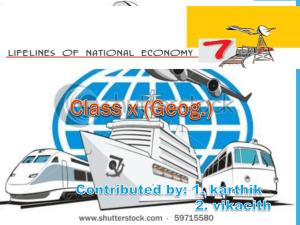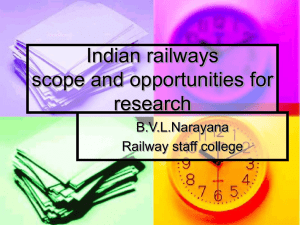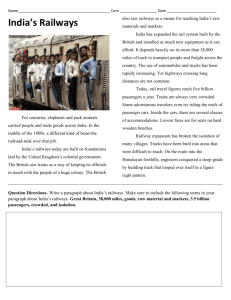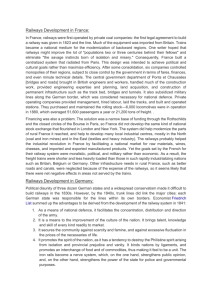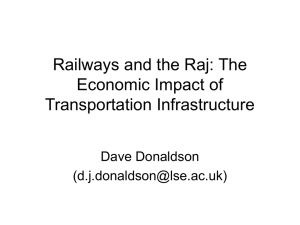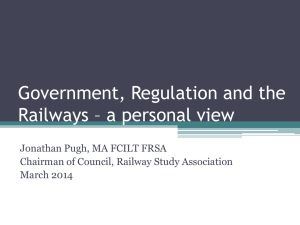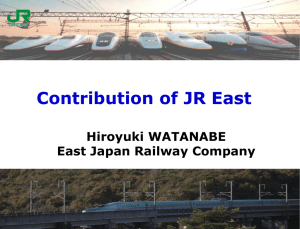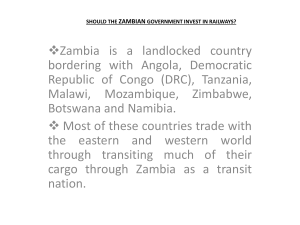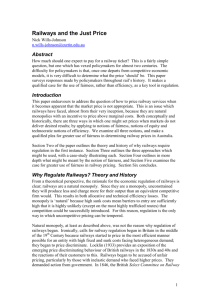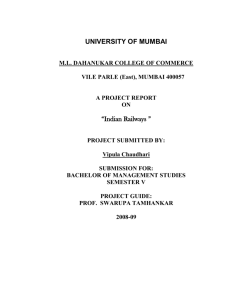Overview The regulation and control of Railways was initially vested
advertisement
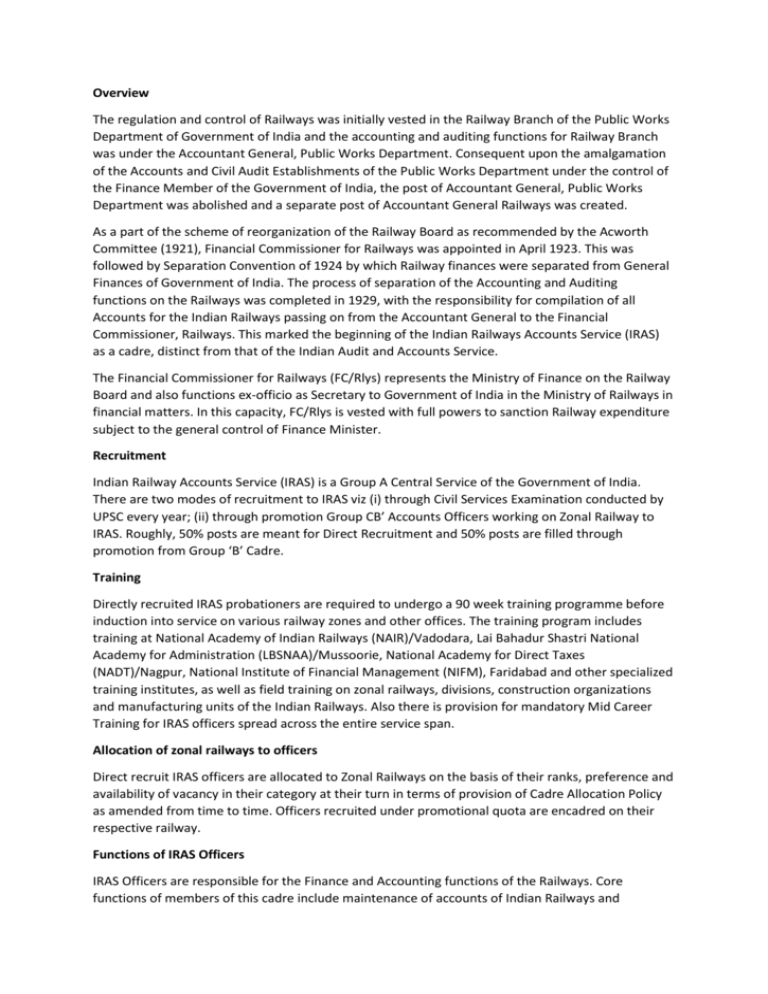
Overview The regulation and control of Railways was initially vested in the Railway Branch of the Public Works Department of Government of India and the accounting and auditing functions for Railway Branch was under the Accountant General, Public Works Department. Consequent upon the amalgamation of the Accounts and Civil Audit Establishments of the Public Works Department under the control of the Finance Member of the Government of India, the post of Accountant General, Public Works Department was abolished and a separate post of Accountant General Railways was created. As a part of the scheme of reorganization of the Railway Board as recommended by the Acworth Committee (1921), Financial Commissioner for Railways was appointed in April 1923. This was followed by Separation Convention of 1924 by which Railway finances were separated from General Finances of Government of India. The process of separation of the Accounting and Auditing functions on the Railways was completed in 1929, with the responsibility for compilation of all Accounts for the Indian Railways passing on from the Accountant General to the Financial Commissioner, Railways. This marked the beginning of the Indian Railways Accounts Service (IRAS) as a cadre, distinct from that of the Indian Audit and Accounts Service. The Financial Commissioner for Railways (FC/Rlys) represents the Ministry of Finance on the Railway Board and also functions ex-officio as Secretary to Government of India in the Ministry of Railways in financial matters. In this capacity, FC/Rlys is vested with full powers to sanction Railway expenditure subject to the general control of Finance Minister. Recruitment Indian Railway Accounts Service (IRAS) is a Group A Central Service of the Government of India. There are two modes of recruitment to IRAS viz (i) through Civil Services Examination conducted by UPSC every year; (ii) through promotion Group CB’ Accounts Officers working on Zonal Railway to IRAS. Roughly, 50% posts are meant for Direct Recruitment and 50% posts are filled through promotion from Group ‘B’ Cadre. Training Directly recruited IRAS probationers are required to undergo a 90 week training programme before induction into service on various railway zones and other offices. The training program includes training at National Academy of Indian Railways (NAIR)/Vadodara, Lai Bahadur Shastri National Academy for Administration (LBSNAA)/Mussoorie, National Academy for Direct Taxes (NADT)/Nagpur, National Institute of Financial Management (NIFM), Faridabad and other specialized training institutes, as well as field training on zonal railways, divisions, construction organizations and manufacturing units of the Indian Railways. Also there is provision for mandatory Mid Career Training for IRAS officers spread across the entire service span. Allocation of zonal railways to officers Direct recruit IRAS officers are allocated to Zonal Railways on the basis of their ranks, preference and availability of vacancy in their category at their turn in terms of provision of Cadre Allocation Policy as amended from time to time. Officers recruited under promotional quota are encadred on their respective railway. Functions of IRAS Officers IRAS Officers are responsible for the Finance and Accounting functions of the Railways. Core functions of members of this cadre include maintenance of accounts of Indian Railways and rendering Financial Advice to the executive. They are responsible for introduction of techniques of modern financial management; exchequer control as a refinement in budgetary control; restructuring of the budgetary and accounting system including institution of a system of performance budgeting and responsibility accounting, traffic costing, implementation of incentive schemes in workshops, etc. The above is illustrative and not exhaustive. These functions inter-alia include the following: Financial Management: (i) Scrutiny of all investment and expenditure proposals of various executive departments relating to the areas of transportation, personnel, motive power, rolling stock, railway electrification, workshops, signal and telecommunication, civil engineering, commercial, medical, safety and security etc. (ii) Control over Plan expenditure, revenue expenses and revenue receipts. (iii) Examination/consolidation and preparation of the Budget and to exercise the budgetary controls as per the procedure laid down, (iv) Carrying out periodical financial reviews so as to monitor both the expenditure and receipts and tender appropriate advice to Administration so as to arrest any budgetary deviations. (v) Association with survey teams & preparation of project reports - precursor to all capital investments decisions. (vi) Mid life review of projects & revision of cost estimates. (vii) Association with tenders and contracts of all departments. (viii) Carrying out productivity tests so as to determine the extent of the projected benefits accruing to the system. (ix) Association with manpower planning: Creation/surrender of posts. (x) Funds Management and raising of funds from the market - ways and means to finance Railway Plans, through conventional and non-conventional sources, viz commercial exploitation of land, Joint Venture and SPV, BOLT Scheme and leasing etc. to meet & finance the investment requirements of Railways particularly concerning replacement of aged assets, safety works and network expansion. Accounting Functions: Account keeping involves booking of all expenditure and earning to correct heads of accounting. While the Capital and Revenue Accounts are prepared to facilitate a review of finances of railways as a commercial undertaking, the Finance Accounts are compiled in accordance with requirements of Government Accounts. Accounting function involves pre-auditing and concurrent auditing of all payments, receipts and adjustment transactions on Railways. The responsibility of Accounts officers in this regard involves: (i) Maintenance of the Books of Accounts, as per prescribed rules. (ii) To carry out the internal checks as per rules and procedures of all transactions affecting receipts and expenditure on the Railways. All claims against railways, whether commercial claim for loss of material, contractors’ bills, suppliers’ bills or establishment claims are required to be checked in accounts department with reference to rules or orders (known as “Internal Check”) before the claims are settled. (iii) Inspection of Stations, Stores Depots, Executive offices. The responsibility encompasses inspection of station accounts to ensure that the accounts submitted by the stations in respect of earnings are not only correct but that all the prescribed initial records are being kept and that the transactions are carried out as per the extant rules and procedures. Similarly Stores Finance wing has a special role to verify the stocks and to see whether the stocks as shown in the books are actually available in the depots or not. Apart from these inspections, accounts officer also inspects the initial records being maintained in various executive offices. (iv) Settlement of claims & recovery of Railways dues. (v) Stock inventory control. (vi) Management of cash and pay office and co-ordination with RBI and other Banks. (vii) Maintenance of assets register/block accounts necessary for determining not only the dividend liability but also depreciation. (viii) The work relating to Electronic data processing and Management information system. (ix) All works relating to Management Accounting.
